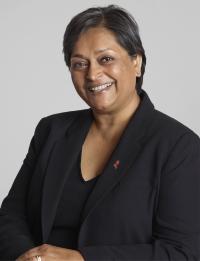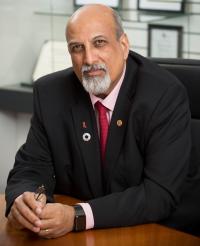
Quarraisha Abdool Karim and Salim S. Abdool Karim Honored with 2024 Lasker Award
The 2024 Lasker~Bloomberg Public Service Award recognizes the Abdool Karims’ global contributions to the fight against HIV/AIDS
The Lasker Foundation today announced the winners of its 2024 Lasker Awards. Quarraisha Abdool Karim and Salim S. Abdool Karim of Columbia University Mailman School of Public Health and CAPRISA were honored with the Lasker~Bloomberg Public Service Award for their contributions to combatting the spread of HIV/AIDS and for transformative public health advocacy and programming throughout Africa and globally.
The Abdool Karims are world-leading AIDS researchers whose main research interests are in understanding the evolving HIV epidemic in South Africa; factors influencing the acquisition of HIV infection in adolescent girls; and sustainable strategies to introduce antiretroviral therapy in resource-constrained settings. “The Abdool Karims have saved lives around the globe through their innovative research, evidence-based policy proposals, public education, and courage to speak truth to power,” the foundation said.
Professor Salim Abdool Karim, MBChB, FFPHM, PhD, CAPRISA Professor for Global Health in the Department of Epidemiology at Columbia University Mailman School of Public Health, is also director of the Centre for the AIDS Program of Research in South Africa (CAPRISA) and also Pro Vice-Chancellor (Research) at the University of KwaZulu-Natal in Durban, South Africa as well as adjunct professor of Medicine at Weill Medical College of Cornell University.
In addition to CAPRISA Professor for Global Health at Columbia Mailman School of Public Health Quarraisha Abdool Karim, PhD, also holds professorships in Public Health at the Nelson R Mandela School of Medicine, University of KwaZulu-Natal in South Africa, and is a visiting scientist at Massachusetts General Hospital and visiting lecturer at Harvard University.
The Abdool Karims have worked side-by-side as spouse-scientists tackling devastating diseases while overcoming scientific and political obstacles. At considerable professional risk, they confronted AIDS denial, provided life-sparing antiviral treatments in defiance of government policy and developed HIV prevention approaches that empower women to protect themselves. They established collaborative HIV research centers, working with international partners on vaccines, immunopathogenesis research, microbicides, and antiviral treatments.
Salim and Quarraisha Abdool Karim were the Principal Investigators of the landmark CAPRISA 004 tenofovir gel trial which provided proof of concept for Microbicides, highlighted by Science as one of the Top 10 scientific breakthroughs in 2010. Their pioneering research highlights the disproportionate impact of HIV on women and girls. They showed that use of an antiretroviral drug, tenofovir, reduced new infections by 39 percent in women who used it for two-and-a-half years. This ultimately led to the creation of a game-changing antiretroviral treatment called Pre-Exposure Prophylaxis—or PrEP—today a crucial element of global HIV prevention endorsed by the World Health Organization. They defined approaches to better treat HIV and tuberculosis co-infection; after five years of use in South Africa, annual deaths decreased by over 50 percent.
In addition to their work in HIV/AIDS, they have continued their scientifically rigorous work in the SARS-CoV-2 pandemic, undertaking rapid surveillance, promoting evidence-based prevention and combatting misinformation on Covid-19 vaccines. In tracking the epidemiology of SARS-CoV-2, the Abdool Karims provided accurate estimations of likely future surges of the coronavirus and assisting Africa to be better prepared for pandemic pressure on its healthcare systems, economies, and social systems.
They played a key role in the national response against COVID-19 in the Republic of South Africa, with Salim serving as chair and Quarraisha as a member of the government’s Ministerial Advisory Committee on COVID-19. He is also a Commissioner on the Lancet Commission on Covid-19 and the African Union’s Commission on Covid-19. She is a member of the Executive Group of the World Health Organization’s COVID-19 treatment and vaccine solidarity trials.
The Abdool Karims have led the Fogarty International Center’s Columbia University HIV training and research program for more than 20 years, providing training for over 600 African researchers. They are members of the U.S. National Academy of Medicine, the World Academy of Science, African Academy of Sciences, Academy of Science in South Africa, and the Royal Society of South Africa. In addition, Salim Abdool Karim is the first African scientist to be appointed to the editorial board of the New England Journal of Medicine. The couple have served as science advisors of the WHO; UNAIDS; PEPFAR; the Global Fund to Fight AIDS, Tuberculosis and Malaria; and the Bill & Melinda Gates Foundation.
“The Abdool Karims are true visionaries for the prevention of HIV and their public health approaches to controlling HIV/AIDS,” said Linda P. Fried, dean of Columbia’s Mailman School of Public Health. “I speak on behalf of the entire faculty and staff of the Mailman School to say we are thrilled with this very deserved recognition for our colleagues’ achievements in the discovery, prevention, and treatment of infectious diseases and what it takes to control, even end, the HIV and TB epidemics by effectively protecting people at risk.”
Earlier this month the Royal Society awarded its Michael Faraday Prize and Lecture to Salim Abdool Karim for his scientific leadership, policy advice, epidemiological analyses, and articulate public education, while actively countering disinformation in Africa, particularly South Africa, during the COVID-19 pandemic.
Professor Q. Abdool Karim is currently vice president (Southern African Region) of the African Academy of Sciences. In 2022 she was elected to serve as the seventh President of The World Academy of Sciences for the advancement of science in developing countries (UNESCO-TWAS).
“We are deeply honored to receive the Lasker Award,” said the Abdool Karims. “As we witness a rise in disinformation and attacks on science that have reached new heights during the Covid-19 pandemic, effective and transparent communication of science has become even more important.”
Established in 1945 by Mary and Albert Lasker, pioneering biomedical research advocates, the Lasker Awards are now widely regarded as America’s preeminent biomedical research prize. The awards carry an honorarium of $250,000 for each category. They will be presented at a gala ceremony in New York City on Friday, September 27, 2024. More information—including additional background on this year’s winners and videos documenting their achievements—is available at laskerfoundation.org.
Since 1945, the Lasker Foundation has awarded more than 400 prizes through the Lasker Awards, renowned as America’s preeminent biomedical research prize. The Lasker Awards recognize the contributions of leaders who have made major advances in the understanding, diagnosis, treatment, cure, and prevention of human disease. Over the years, 97 Lasker Laureates have also received the Nobel Prize, including nine since 2018.
Watch a Lasker Foundation video about the Abdool Karims:
Media Contact
Stephanie Berger, sb2247@cumc.columbia.edu

